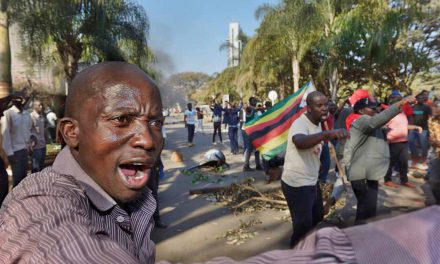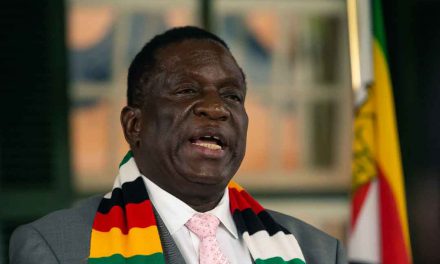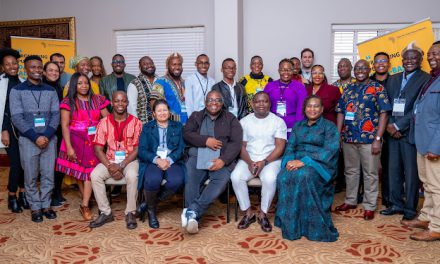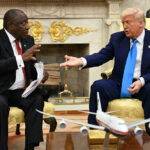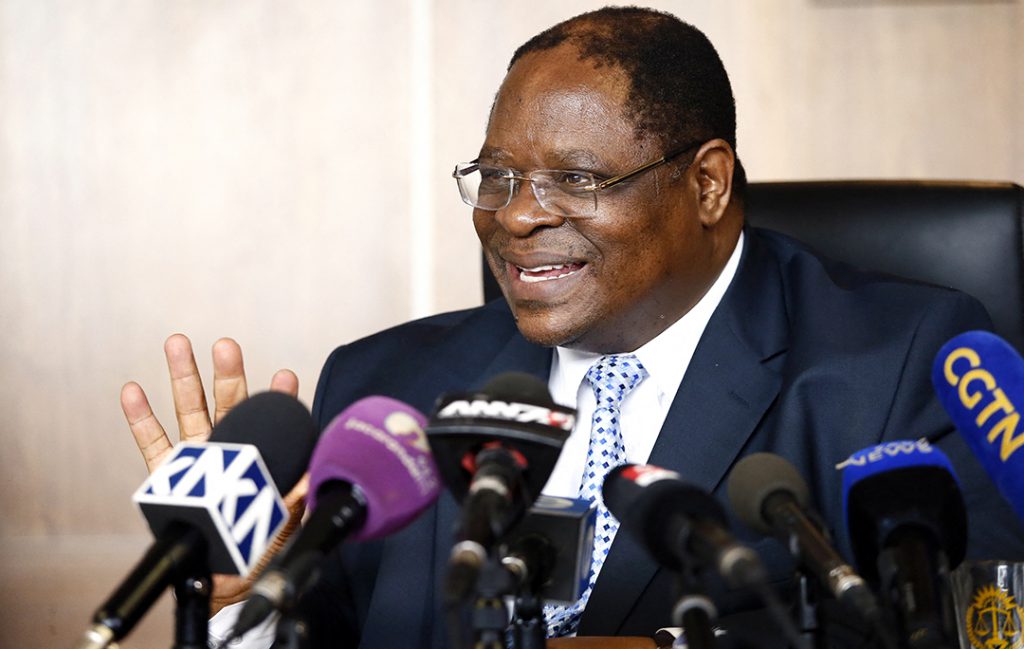
South Africa’s Deputy Chief Justice Raymond Zondo, head of an investigation commission into corruption allegations at the highest levels of the state, holds a press conference on January 23, 2018 in Midrand. – South Africa’s President Jacob Zuma, whose image has been tarnished by corruption allegations, is facing growing pressure to resign before his term as president ends in 2019. (Photo by Phill Magakoe / AFP)
Despite its internal and electoral weaknesses, the African National Congress (ANC) still enjoys the mandate to govern from the most recent national elections in 2019. The delicate relationship between internal dynamics within the governing ANC and the hollowing out of the state is a critical issue that emerged from the work of the Judicial Commission of Inquiry into allegations of State Capture, Corruption and Fraud in the Public Sector, more commonly known as the Zondo Commission. On 4 January 2022, the Commission published the first of three reports. The first part focuses on corruption and the flouting of procurement processes through the tender system, looking at the Gupta family-owned The New Age newspaper, the South African Revenue Service (SARS), and South African Airways (SAA). The next two are expected to be published by the end of February.
The reports set the tone for a political minefield that promises several explosions for the ruling party if it fails to navigate them correctly. During the course of this year, the ANC will hold its National General Council (NGC) and its 55th national elective conference (NEC). Over the immediate term, given the increasing levels of party-state conflation, the ruling party’s internal response to the Zondo Commission findings is of utmost relevance, as it has implications for the governing of the country. There is a clear need to rebuild the state in line with the Commission’s recommendations. The question is whether the functioning of state institutions can be improved in the current climate, with a ruling party beset by internal challenges.
‘Making Zondo’s findings count is not government’s job alone’ – Read moreSince its inception, the Zondo Commission has highlighted the deep rot in public management and a systemic weakening of the institutions and authority of the South African state. Broadly, the Commission’s work highlighted the corrupt relationship between specific groups, including high-level ANC political players and business actors, and reveals the extent of abuse of state power in pursuit of their private interests at the expense of the public good.
A big part of the problem stems from how state institutions become casualties of politicisation and their resources weaponised as capital in political battles for positions within the party. Historically, this was seen in previous electoral conferences, particularly in the showdown between Thabo Mbeki and Jacob Zuma in 2007 for the party presidency. It is well documented that the National Prosecuting Authority and its Directorate of Special Operations, the former Scorpions, were abused for political ends by some individuals during that conference. A similar pattern emerged 10 years later at the party’s last electoral conference with the factional battles between Cyril Ramaphosa and Nkosazana Dlamini-Zuma, who both campaigned for the ANC presidency. As detailed during the proceedings in the Zondo Commission, in that contest, human and monetary resources from the State Security Agency and the South African Police Service were used despite no apparent threats to the state’s security and law and order. As a sign of things to come, as early as 2019, claims emerged that Lindiwe Sisulu, one of the likely contenders for the ANC presidency, was loading her ministry with key supporters to build a campaign for this year’s contest. Jostling for position is now clearly in full swing. To mark her campaign position, Minister Sisulu recently engaged in attacks on the Constitution and the judiciary, which elicited an unprecedented response from the judiciary.
President Ramaphosa now faces a dilemma; there are unavoidable casualties regardless of which actions he attempts based on the Commission’s recommendations. Whether he fires implicated ministers, which is his prerogative and is encouraged by the ANC’s step aside rule to that effect, or centralises state authority in the office of the presidency, as he increasingly has, he will face criticism. Former President Thabo Mbeki increasingly centralised authority in his presidency, with Jacob Zuma capitalising on the mistake. To outmanoeuvre political enemies, Ramaphosa must reform key institutions in the criminal justice system. These were hollowed out by his predecessor Jacob Zuma, who used their consequent weakness as a political tool to avoid prosecution.
Whatever Ramaphosa chooses to do and whichever move he attempts will likely impact his position as the party’s leader. Considering the different party factions and competing interests, any actions Ramaphosa takes are likely to produce dissatisfaction within the camps opposed to his leadership. At the state level, the president’s inability to affect change and deal decisively with the scourge of corruption may lead to growing dissatisfaction among the broader population and opposition parties.
As a party, the ANC should fully support the Commission’s findings. A first step signalling the seriousness of its commitment to the process was the recent establishment of a National Executive Committee (NEC) task team to guide its response. The committee will be led by luminaries Justice Minister Ronald Lamola, former minister Jeff Radebe, and NEC members Joel Netshithenzhe and Lindiwe Maseko. There is nonetheless a risk that the party will ignore the report’s seriousness and water down the Commission’s recommendations. For one, Gwede Mantashe, the party’s Chairperson and Minister for Mineral Resources and Energy, called for the Zondo reports to be “dealt with internally” and used for the renewal of the ANC, this despite the fact that the Commission has, to date, used over R1 billion of taxpayers’ money intended for advancing the public interest. The ANC chairperson further cautioned party members against using the state capture report “to settle scores”. Given the growing internal contestation, the odds that the reports will be used as a smearing tool are high: some cabinet ministers and party NEC members have, of late, been bickering in public over issues, including the role of the judiciary and the pre-eminence of the Constitution, which is now an arena of debate where embarrassing ideological conflicts within the party are playing out.
[activecampaign form=1 css=1]
These public spats are now playing out in a year that had presented an opportunity for the ANC to correct past wrongs and implement both party and state reform. The party will hold its NGC before its electoral conference in December. The NGC is meant to be an internal forum for policy discussions where the vision and direction are articulated. Its deliberations must result in resolutions that can be translated into immediate programmes to be implemented by the party and functionaries in government towards rebuilding state capacity to meet development demands.
A detailed party plan of action should emanate from the Commission’s findings and recommendations. The ANC can demonstrate stronger political will and adopt efforts to aggressively combat rampant corruption by:
- Addressing the prolific procurement abuses through rigorous adherence to supply chain management policies and procedures, accompanied by stringent due diligence requirements.
- Establishing a national anti-corruption agency and a statutory body that may guard against malfeasance in the interface between government officials and private individuals and businesses.
- Demonstrating a commitment and implementing policies towards the professionalisation of the public service with the appointment of competent administrative heads. Appointments must be de-politicised and awarded based on competence ahead of party loyalty.
- Developing professional deployment systems. This can start by assessing the functioning and effectiveness of the deployment committee and the current policies and practice of cadre deployment.
- Supporting measures to strengthen the state’s criminal justice system, particularly law enforcement agencies, and the state’s detection, investigation, and prosecutorial arms.
Rebuilding state effectiveness requires the involvement of well-intentioned actors. At a political level, it will require effective, ethical leadership. The ANC is reeling from a bruising local government election campaign in 2021 that saw the loss of crucial metros and an electorate tired of the failures in governance and service delivery. As it navigates this period, the ANC must engage in forthright action that actively addresses the country’s governance problems. If the party ignores this opportunity to promote and implement good governance as stipulated in the Zondo Commission’s reports, their mandate to continue governing may be at risk.
Stuart is a Researcher in the Governance Delivery and Impact programme at Good Governance Africa. He holds a Master of Arts degree in Security and Strategic Studies from the University of Pretoria. His dissertation explored the linkages between marginalisation and insecurity, looking at the securitisation of service delivery protests in South Africa. Before joining Good Governance Africa, He was a Junior Research Fellow with the Centre for Law and Society at the University of Cape Town. Before that, he worked as a research consultant at the Institute of Security Studies with the Justice and Violence Prevention Programme and as a Junior Lecturer for the Department of Political Sciences at the University of Pretoria.



